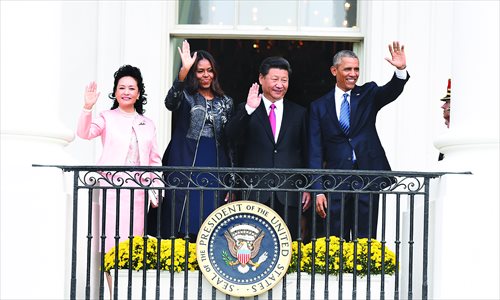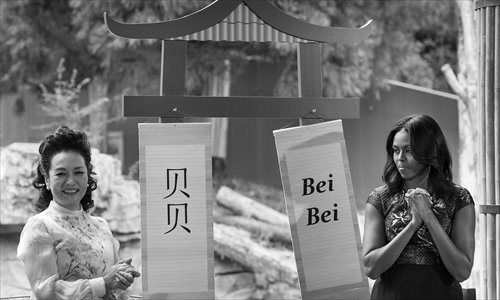HOME >> CHINA
Xi, Obama share visions on climate
By Jiang Jie Source:Agencies – Global Times Published: 2015-9-26 9:40:37
Presidents agree neither country will knowingly support cyber theft

US President Barack Obama (right) and First Lady Michelle Obama (second from left) hosts Chinese President Xi Jinping (second from right )and his wife Peng Liyuan at the White House for a state visit on Friday in Washington, DC. Photo: AFP

Peng Liyuan (left), first lady of China, and US First Lady Michelle Obama unveil the name of the baby panda which they chose at the Smithsonian’s National Zoo on Friday in Washington, DC. Photo: AFP
Chinese President Xi Jinping and his US counterpart Barack Obama secured a number of agreements on Friday, including a carbon cap-and-trade system in 2017 in China to help contain the country’s emissions.
The two presidents delivered the joint presidential statement which outlined their common vision for a global climate change agreement and new steps to slash their greenhouse gas emissions.
The commitment was built on a bilateral announcement on climate change last November, when China agreed to cap its rising emissions by at least 2030, while the US pledged to reduce its greenhouse gas emissions 26 to 28 percent below 2005 levels by 2025.
China also announced to channel 20 billion yuan ($3.1 billion) to help developing countries combat and adapt to climate change, while the US reaffirmed to channel $3 billion into a UN-backed Green Climate Fund.
The funding will be crucial for building support for a global climate change agreement to be reached in Paris in December from developing countries, analysts said.
The carbon trade system in China will reportedly cover key sectors including power generation, iron and steel, chemicals and cement.
“Those sectors together produce a substantial percentage of China’s climate pollution, and this reflects a significant policy move that the Chinese are announcing they will take,” a US official told reporters Thursday.
Zhang Xiaobo, a Beijing-based expert on carbon trade, told the Global Times on Friday that the announcement can improve China’s national image as it demonstrates the nation’s resolution to fight pollution.
“As a new mechanism, a carbon trade system can help press companies to cut emissions in a more efficient way through market leverage,” Zhang said, adding that it will also stimulate for the emerging carbon trade industry in China.
“China’s commitment can also become an example of a carbon trade system to other developing countries, which will be useful at the climate conference in Paris,” he said.
The two presidents also agreed on to take new steps to address cyber spying issues, saying in a joint statement that neither country’s government would conduct or knowingly support cyber-enabled theft of intellectual property.
They also agreed to create a senior expert group to further discuss cyber issues, and a high-level group to talk about how to fight cyber crime that will meet by the end of 2015 and twice a year after that, the White House said in a statement.
During the joint conference, Xi called not to politicize cyber issues and that the two countries should turn cyberspace into source of growth instead of point of confrontation.
Visiting Seattle on the first leg of his trip, Xi denied involvement by the Chinese government in cyber theft and pledged to work with the US to fight cyber crime.
On other topics, Xi said that China will not pursue militarization of the Nansha Islands in the South China Sea and he also voiced support to peaceful denuclearization of Korean Peninsula via six-party talks.
The White House also said that the two countries have agreed to exchange information to counter transnational flow of foreign terrorists.
“We must uphold the right direction of building a new model of major-country relations, make sure our relationship is defined by peace, respect and cooperation, and see through it that it keeps moving forward on the sound track of steady growth,” Xi said in a speech at a welcome ceremony on the South Lawn of the White House.
In a three-hour talk with Obama in the Blair House on Thursday, Xi said that it is a priority in Chinese diplomatic policies to seek a Sino-US relationship that shows mutual respect and win-win cooperation without confrontations. “The Pacific is large enough to hold the development of both China and the US.”
“As the world speeds up its globalization, Sino-US relations have also entered a transition period. The bilateral relations now affect the Asia-Pacific and the world, which also requires more cooperation between the two countries to deal with global challenges,” Su Ge, president of the China Institute of International Studies, told the Global Times on Friday.
Xi’s visit will further show the world a national image of China as a responsible major power, Su added.
During the Thursday meeting, Xi reiterated that reform and opening-up are basic State policies of China and fundamental driving forces for the country’s future development.
“China will never close its doors to the outside world,” Xi emphasized, pledging a more open, relaxed and transparent environment for foreign business to invest and operate in China.
Xi added that China will also unswervingly safeguard its sovereignty, security and development interests.
“The Thursday meeting, though not a formal one, was also significant because it can help the two presidents exchange views on strategic intentions and dispel concerns. There have been negative speculations on China’s development in the US, especially as the presidential election draws near,” Su said.
Agencies – Global Times
Posted in: Diplomacy